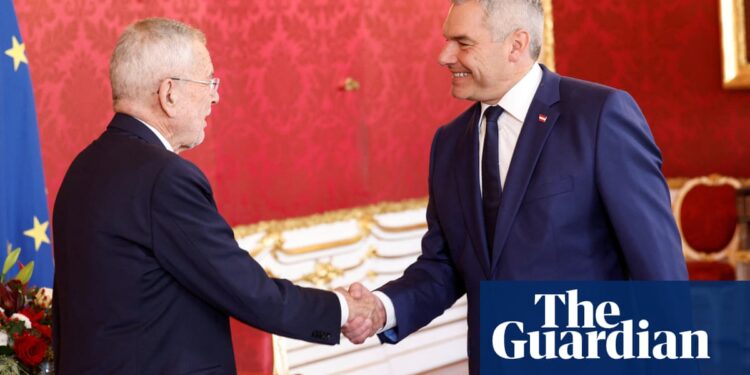Austria’s president has tasked the incumbent chancellor with forming a new government, after the general election winner, the far-right Freedom party (FPÖ), failed to find a coalition partner to allow it to take power.
Alexander van der Bellen, the 80-year-old head of state, told reporters he had asked Karl Nehammer, head of the centre-right People’s party (ÖVP), to begin negotiations with the centre-left Social Democrats (SPÖ).
“Austria needs a stable government with integrity that is able to act,” van der Bellen, who under the constitution formally names the chancellor, said, as he announced he had, unusually, selected the losing party to begin coalition talks.
Nehammer’s ÖVP has governed since 2021 in a coalition with the Greens, but both parties suffered heavy losses in the 29 September election in which the Eurosceptic, pro-Moscow, anti-Muslim FPÖ rode a wave of voter anger over immigration and inflation to a historic first-place finish.
The FPÖ’s leader, Herbert Kickl, had insisted that his party, which drew 29% of the vote, should have the first crack at forming a government. The ÖVP won 26% and the SPÖ sank to its worst-ever result of 21%.
But all the mainstream parties represented in parliament refused to work with Kickl as chancellor, creating an impasse in the small Alpine country, which has outsize influence in the EU owing to its strong alliances and role as a geographic crossroads.
“Herbert Kickl can’t find a coalition partner to make him chancellor,” said van der Bellen, a former leader of the Greens, who has long vocally opposed the far right.
Nehammer, who during the campaign did not rule out cooperating with the FPÖ after several alliances at the regional and federal level, said this month he would not be Kickl’s “stirrup holder”. Kickl, who cites Hungary’s autocratic leader Viktor Orbán as a role model, said his party would only join a government if he were chancellor.
Kickl has long courted controversy and campaigned on a slogan to become “Volkskanzler” (people’s chancellor), a term once used for Adolf Hitler. The FPÖ, founded in the 1950s by former Nazis, calls for “remigration” – forced deportation – of immigrants and foreign-born citizens considered poorly integrated. It has also called for a stop to western support for Ukraine’s defence against Russia and to EU sanctions against Moscow.
Van der Bellen, in a short speech at Vienna’s Hofburg palace, said the leaders of the ÖVP and SPÖ had told him that concerns about Austria’s democracy and the rule of law under any government with the FPÖ had made cooperation impossible, as well its Kremlin-friendly stance and proximity to rightwing extremist groups.
after newsletter promotion
Together, the ÖVP and the Social Democrats would have a wafer-thin majority in parliament. They will have to discuss whether to invite a third party, likely to be the liberal NEOS, which won 9%, to the talks in order to form a broader, more stable coalition.
However, the unpopularity of Germany’s first-ever three-way coalition under chancellor Olaf Scholz, which has been hobbled by infighting, serves as a cautionary tale for its smaller neighbour.
Van der Bellen is expected to name Austria’s next chancellor by January.







